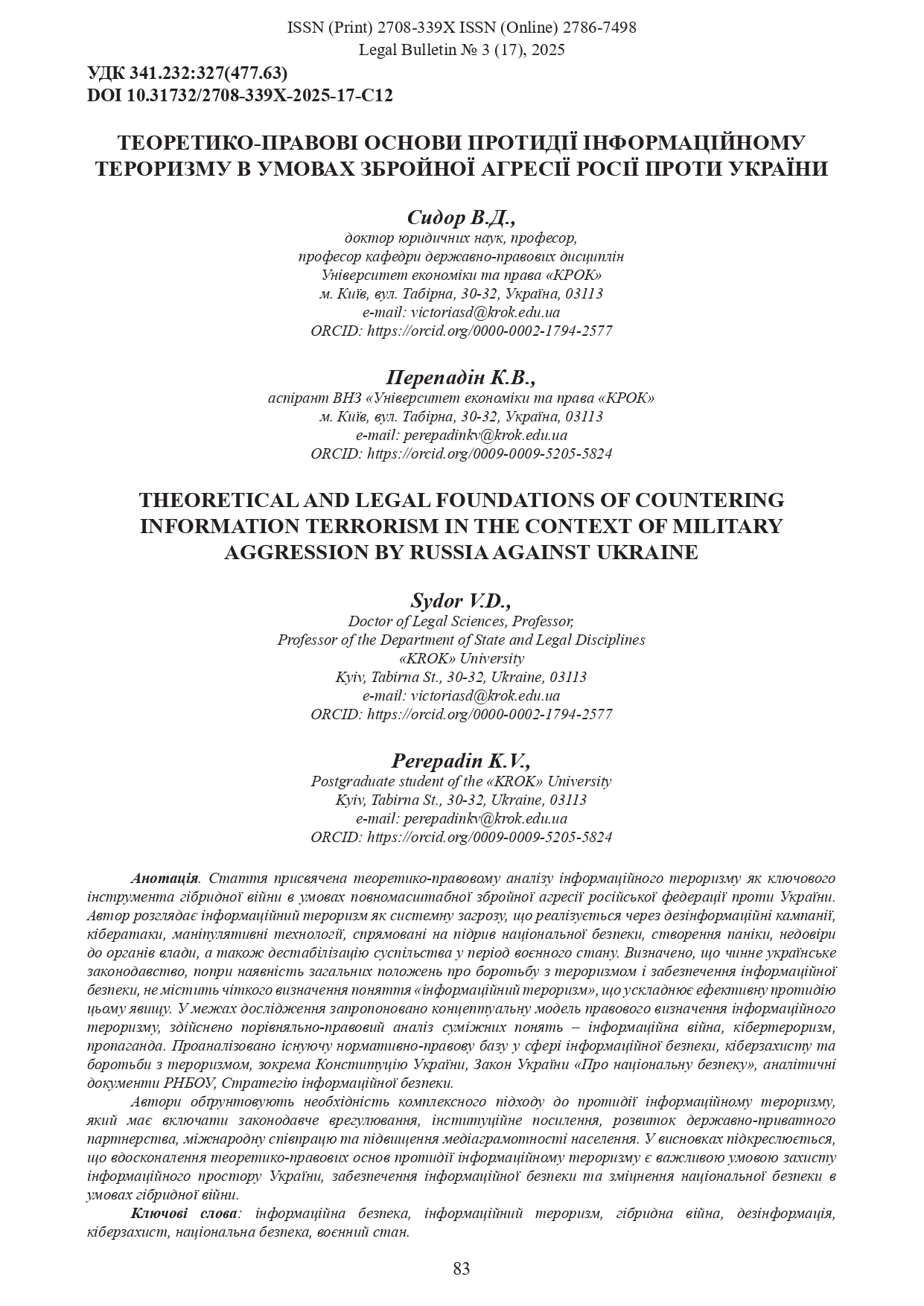THEORETICAL AND LEGAL FOUNDATIONS OF COUNTERING INFORMATION TERRORISM IN THE CONTEXT OF MILITARY AGGRESSION BY RUSSIA AGAINST UKRAINE
DOI:
https://doi.org/10.31732/2708-339X-2025-17-C12Keywords:
: information security, information terrorism, hybrid warfare, disinformation, cyber defense, national security, martial lawAbstract
The article is dedicated to the theoretical and legal analysis of information terrorism as a key tool of hybrid warfare in the context of the full-scale military aggression of the Russian Federation against Ukraine. The author considers information terrorism as a systemic threat, realized through disinformation campaigns, cyber attacks, manipulative technologies aimed at undermining national security, creating panic, distrust in government authorities, and destabilizing society during a state of war. It is determined that current Ukrainian legislation, despite having general provisions on combating terrorism and ensuring information security, does not contain a clear definition of the concept of ‘information terrorism,’ which complicates effective counteraction against this phenomenon. Within the framework of the study, a conceptual model for the legal definition of information terrorism is proposed, and a comparative legal analysis of related concepts – information warfare, cyberterrorism, and propaganda – is carried out.
An analysis has been conducted of the existing legal framework in the field of information security, cyber defense, and counter-terrorism, in particular the Constitution of Ukraine, the Law of Ukraine «On National Security», analytical documents of the National Security and Defense Council of Ukraine, and the Information Security Strategy.The authors argue for the necessity of a comprehensive approach to countering information terrorism, which must include legislative regulation, institutional strengthening, the development of public-private partnerships, international cooperation, and the enhancement of media literacy among the population. The conclusions emphasize that improving the theoretical and legal foundations for countering information terrorism is an important condition for protecting Ukraine’s information space, ensuring information security, and strengthening national security in the context of hybrid warfare.Keywords: information security, information terrorism, hybrid warfare, disinformation, cyber defense, national security, martial law.
References
Про національну безпеку України : Закон України від 21.06.2018 № 2469-VIII. Відомості Верховної Ради України. 2018. № 31. Ст. 241.
Про боротьбу з тероризмом : Закон України від 20.03.2003 № 638-IV. Відомості Верховної Ради України.
№ 25. Ст. 180.
Конституція України : Закон України від 28.06.1996 № 254к/96-ВР. Відомості Верховної Ради України.
№ 30. Ст. 141.
Ліпкан В. Тероризм і національна безпека України. К.: Знання, 2000. 184 с.
Леонов Б.І., Лихова С.П. Інформаційний тероризм як загроза національній безпеці України. Наукові праці Київського авіаційного інституту. Серія: Юридичний вісник «Повітряне і космічне право». 2021, 2(59). С. 170-
https://doi.org/10.18372/2307-9061.59.15615 DOI: https://doi.org/10.18372/2307-9061.59.15615
З початку року Держспецзв’язку зафіксувала понад 1000 кіберінцидентів. Укрінформ. URL: https://www. ukrinform.ua/rubric-technology/3850123-z-pocatku-roku-derzspeczvazku-zafiksuvala-ponad-1000-kiberincidentiv.html (дата звернення: 10.07.2025).
Про рішення Ради національної безпеки і оборони України від 15 жовтня 2021 року «Про Стратегію ін- формаційної безпеки» : Указ Президента України від 28.12.2021 № 685/2021. URL: https://www.president.gov.ua/ documents/6852021-41005 (дата звернення: 10.07.2025).
Горбулін В. П., Качинський А. Б. Гібридна війна як інструмент реалізації геостратегії реваншизму. Стра- тегічні пріоритети. 2021. № 2 (58). С. 5-12.
Мельник Д.С. Кібертероризм: поняття, форми прояву, перспективні заходи протидії. Вісник Харківського національного університету внутрішніх справ. Харків, 2023. № 3(102). С. 144-158.

Downloads
Published
How to Cite
Issue
Section
License
Copyright (c) 2025 Сидор В.Д., Перепадін К.В.

This work is licensed under a Creative Commons Attribution 4.0 International License.




